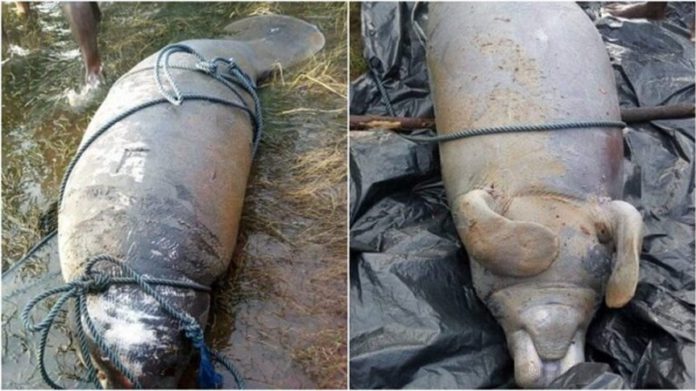Fishers in Nketepa, a fishing Community in Kwahu East District of the Eastern Region on Saturday June 6 bycaught a rare marine mammal in the Afram River.
It took the tedious efforts of many fisher-folks in the area to pull the mammal trapped in the fishing net to shore.
The creature which looks like Manatee Sea Cow was eventually killed and meat shared among the fishers.
Assembly Member for the area Yaw Bossu told Starr News it was the first time fishers in the have bycatch such marine mammal although other communities around have been bycatching.
There have been many instances of so-called accidental catching of rare marine mammal species by fishermen operating in the Afram River.
Bycatching, though a serious threat to the existence of endangered aquatic species, receives little or no attention by the Fisheries Ministry in Ghana.
The Kwahu- NKetepa incident calls for exigency of solution to this problem through awareness and enforcement fishing laws.
Ghana has no data on these incidents despite its prevalence in fishing Communities.
Globally, it is estimated that 40% translating into 38 million tonnes of fish catch worldwide is unintentionally caught and is partly thrown back into the sea, either dead or dying or illegally consumed.
A large amount of this is either thrown back into water bodies dead, seriously injured, or disposed of on land while others eat without approval.
According to experts, drift nets and gill net operations are among the most dangerous fishing techniques that traps these marine mammals.
Marine turtles, cetacean, young fishes , seabirds,sharks, corals and invertebrates are largely victims of bycatching.
In October 2014, USAID/Ghana awarded CRC/URI a five year cooperative agreement to lead the Sustainable Fisheries Management Project (SFMP).
The goal of the project was to rebuild targeted marine fish stocks that have seen major declines in landings in decades, particularly the small pelagic fisheries that are important for food security and are the mainstay of the small-scale fishing sector.
CRC leads a consortium of partners tasked with an integrated suite of activities including Improved legal enabling conditions for implementing co-management, use rights, capacity and effort-reduction strategies, Improved information systems and science-informed decision-making, and
Increased constituencies that provides the political will and public support necessary to make the hard choices and changed behavior needed to rebuild Ghana’s marine fisheries sector.
These components feed into applied management initiatives for several targeted fisheries ecosystems.
While preventing depletion of fish population in water bodies in Ghana,it is imperative a critical look in taken into bycatching menace which also has rippling implications on aquatic life.

